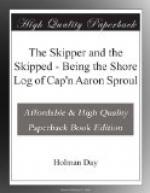And when Smyrna flocked around, the Cap’n faced them, his fist twisted in Mr. Luce’s collar.
“This critter belongs in State Prison, but I ain’t goin’ to send him there. He’s goin’ onto our poor-farm, and he’s goin’ to work for the first time in his life, and he’ll keep to work till he works up some of the bill he owes this town. He’s a pauper because his wife has called on. But I ain’t dependin’ on law. I’m runnin’ this thing myself. I’ve shown ye that I can run it. And if any of you quitters and cowards have got anything to say why my sentence won’t be carried out, now is the time to say it.”
He glowered into their faces, but no one said anything except Zeburee Nute, who quavered: “We allus knowed you was the smartest man that ever came to this town, and—”
“Close that mouth!” yelped Cap’n Sproul. “It’s worse than an open hatch on a superphosphate schooner.”
“You dare to leave that town farm, you or your wife either,” the selectman went on, giving Mr. Luce a vigorous shake, “and I’ll have you in State Prison as quick as a grand jury can indict. Nute, you hitch and take him down there, and tell the boss he’s to work ten hours a day, with one hour’s noonin’, and if he don’t move fast enough, to get at him with a gad.”
Mr. Luce, cowed, trembling, appealing dumbly for sympathy, was driven away while the first selectman was picking up the sack that still lay in the village square. Without a moment’s hesitation he slit it with his big knife, and emptied its contents into a hole that the spring frosts had left. Those contents were simply rocks.
“In the name of Joanthus Cicero!” gasped Broadway, licking his dry lips. “How did you figger it?”
The Cap’n finished kicking the sack down into the hole beside the rocks, clacked shut his knife-blade, and rammed the knife deep into his trousers pocket.
“When you critters here in town get to be grown up to be more than ten years old,” he grunted, surveying the gaping graybeards of Smyrna, “and can understand man’s business, I may talk to you. Just now I’ve got something to attend to besides foolishness.”
And he trudged back into the town house, with his fellow-citizens staring after him, as the populace of Rome must have stared after victorious Caesar.
XXXI
For some weeks the town of Smyrna had been witnessing something very like a bear-baiting.
Cap’n Aaron Sproul, first selectman, again played the role of the bear, as he had on occasions previous.
They had stalked him; they had flanked him; they had surrounded him; they had driven him to centre; he was at bay, bristling with a sullen rage that was excusable, if viewed from the standpoint of an earnest town officer. Viewed from the standpoint of the populace, he was a selfish, cross-grained old obstructionist.




